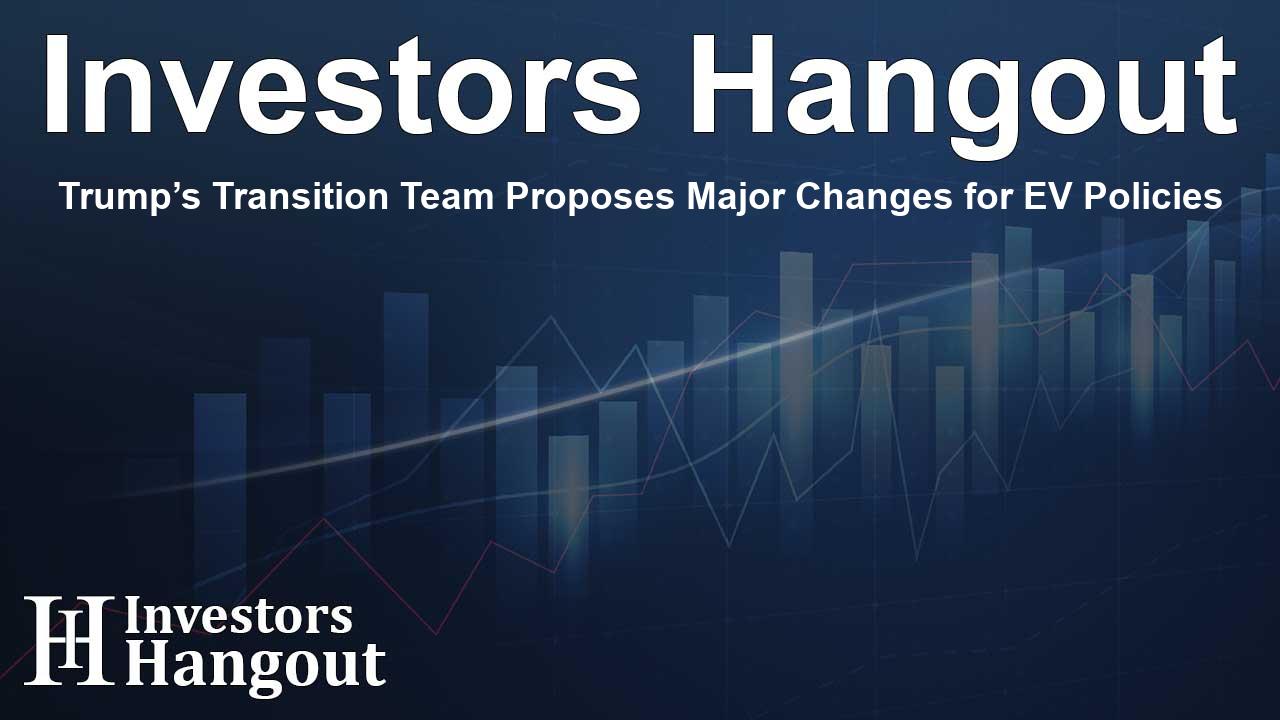Trump’s Transition Team Proposes Major Changes for EV Policies

Trump's Transition Team's Recommendations for the Auto Industry
As Donald Trump prepares to assume the presidency, his transition team has put together a set of recommendations that could dramatically alter the current landscape for electric vehicles (EVs) and emissions policies in the U.S. The focus lies heavily on redirecting support away from electric drive cars and charging infrastructure, which they believe is necessary to enhance national defense capabilities.
Significant Shifts in EV Support and Emission Standards
The transition team is advocating for a reduction in government incentives for electric vehicles, notably calling for the termination of the $7,500 tax credit available to consumers purchasing EVs. This could cause serious consequences for EV sales during a period when many established auto manufacturers, such as General Motors and Hyundai, are introducing a broader selection of electric models to the market.
Additionally, the recommendations could permit an increase in gas-powered vehicle production. The team proposes rolling back emissions and fuel-economy regulations established by the Biden administration, realigning them with standards from 2019. Such changes might lead to vehicles producing higher emissions per mile and a lower average fuel economy.
Tariffs on Battery Materials and Imports
One of the more controversial recommendations involves imposing tariffs on battery materials sourced globally. This strategy is intended to stimulate production within the United States while negotiating exemptions with allied nations. By doing so, they aim to secure domestic supplies of essential components required for electric vehicle production.
These tariff proposals are poised to challenge the existing trade environment, especially regarding the involvement of other countries, particularly China, in the EV supply chain. Given that the global EV market is seeing significant competition, such measures could shift the balance, favoring U.S. industry players.
Impact on California's Emission Policies
Another key aspect of the proposals is blocking California from enforcing its stricter vehicle-emission regulations. California has previously sought permission from the Environmental Protection Agency (EPA) to implement a new set of requirements which are intended to push all vehicles toward electric, plug-in hybrid, or hydrogen-powered technologies by 2035. The Trump administration's approach seeks to eliminate such state-level restrictions, potentially undermining California's regulatory authority.
Strategic Focus on National Defense
The transition plans highlight a stronger emphasis on securing the supply of critical minerals and battery components as necessary for national security. The Defense Department has raised concerns regarding U.S. vulnerability stemming from reliance on foreign materials, particularly from China, for battery production—and this strategy seems geared toward addressing those vulnerabilities.
Furthermore, the plans indicate a need to pivot funds from expanding charging infrastructure toward enhancing capabilities for processing critical minerals essential for defense-related production. By aligning the automotive strategy with national defense objectives, Trump’s team aims to redefine the priorities affecting industry growth and innovation.
Conclusions from the Transition Team's Recommendations
The proposals showcased by Trump’s transition team underscore a marked departure from the prior administration's policies aimed at advancing the electric vehicle market. With the automotive landscape undergoing a transformative shift, the forthcoming policies could not only affect EV templates but may also slow down the transition towards cleaner vehicle technologies.
With various stakeholders watching closely, it will be vital to balance economic development, environmental responsibility, and national security as the new administration outlines its approach in the coming months. The road ahead may be bumpy, but it promises significant changes in how the auto industry operates in the U.S., reflecting a paradigm shift in policy priorities.
Frequently Asked Questions
What are the main recommendations from Trump's transition team?
The transition team is advocating for reduced support for EVs, imposing tariffs on battery materials, and rolling back emissions standards.
How will these changes impact electric vehicle sales?
Eliminating tax credits and rolling back support could hinder EV sales, especially during a time of increased competition from automakers.
Why are tariffs on battery materials being considered?
Tariffs aim to enhance U.S. production of essential EV components and mitigate reliance on foreign suppliers, particularly China.
What is the effect of blocking California's emissions standards?
This would prevent California from setting stricter emissions rules, which other states have adopted, and impacts their regulatory authority.
How are national defense and EV policies connected?
The transition team emphasizes that securing domestic supplies of critical minerals and battery components is crucial for national security, aligning automotive policies with defense priorities.
About Investors Hangout
Investors Hangout is a leading online stock forum for financial discussion and learning, offering a wide range of free tools and resources. It draws in traders of all levels, who exchange market knowledge, investigate trading tactics, and keep an eye on industry developments in real time. Featuring financial articles, stock message boards, quotes, charts, company profiles, and live news updates. Through cooperative learning and a wealth of informational resources, it helps users from novices creating their first portfolios to experts honing their techniques. Join Investors Hangout today: https://investorshangout.com/
Disclaimer: The content of this article is solely for general informational purposes only; it does not represent legal, financial, or investment advice. Investors Hangout does not offer financial advice; the author is not a licensed financial advisor. Consult a qualified advisor before making any financial or investment decisions based on this article. The author's interpretation of publicly available data shapes the opinions presented here; as a result, they should not be taken as advice to purchase, sell, or hold any securities mentioned or any other investments. The author does not guarantee the accuracy, completeness, or timeliness of any material, providing it "as is." Information and market conditions may change; past performance is not indicative of future outcomes. If any of the material offered here is inaccurate, please contact us for corrections.